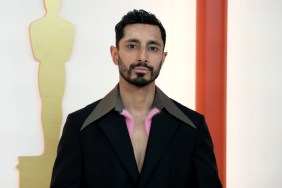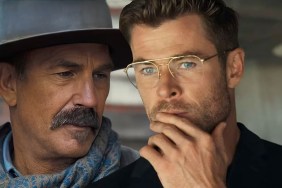Denmark’s Nicolas Winding Refn has yet to really establish himself among mainstream American audiences, but anyone who has seen his ambitious “Pusher Trilogy” or last year’s crime drama Bronson–starring Tom Hardy from Inception in a very different role–knows that Refn has a truly unique way of looking at the world that he brings to his diverse array of innovative films.
With his new movie Valhalla Rising, he takes on a genre one would think to be an obvious slam dunk for a Scandinavian, the Viking drama, and it reteams Refn with his long-time filmmaking partner Mads Mikkelsen, one of Denmark’s top actors who has become known in the States from roles in Casino Royale and Clash of the Titans. This time, Mikkelsen plays “One-Eye,” a silent warrior in 1000 AD who escapes from his life in captivity as a fighter along with his young caretaker and joins another group of Vikings in their quest for the New World, only to be caught for weeks in a heavy unrelenting fog.
Refn isn’t quite as eccentric or wacky as his countrymate Lars von Trier, though Valhalla Rising sometimes veers into a similar dreamlike state as Antichrist, rather than being the type of hack ‘n’ slash, blood ‘n’ guts Viking movie one might expect from the guy who has depicted some of the most gruesome violence imaginable in previous films.
ComingSoon.net sat down with Refn a few weeks ago to talk to him about the movie and other things, our third interview with the director, in fact. Admittedly, there were a few times where we really had no idea what he was talking about, but once we got past that, we had a fairly deep conversation about the problems as a filmmaker balancing commercialism and art, as well as his thoughts on what looks to be his first foray into Hollywood with an adaptation of James Sallis’ Drive, starring Ryan Gosling.
ComingSoon.net: When I spoke to you last year at Sundance for “Bronson,” had you already started this movie?
Nicolas Winding Refn: I was in post-production.
CS: I spoke to Mads last week and he talked about shooting this movie…
Refn: What did he say?!?
CS: We’ll get into that in a minute. I’ve interviewed him a few times since “Bronson” came out, and I couldn’t figure out where “Valhalla Rising” fit into the movies he’d been making. I assumed it was right before “Clash” early last year, but it must have been 2008 then.
Refn: Yeah, yeah.
CS: I know this movie you had planned on doing this before “Bronson” came up, so had you even started shooting anything for this?
Refn: No, actually I was just preparing “Valhalla” so I went and took a break from that, and I wrote “Bronson” then shot it and started editing it and locked picture once I went into physical production with “Valhalla Rising.” They were shot back-to-back basically.
CS: I remember it was really tight, so at Sundance you hadn’t actually edited “Valhalla Rising.”
Refn: I was in the editing.
CS: I think people think it’s somewhat a given that a Danish filmmaker might eventually do a Viking movie, kind of like a Japanese filmmaker doing a samurai film…
Refn: Yeah, obviously.
CS: I guess so, but it might not be that obvious, because there haven’t been that many Danish Viking movies, at least none that I know of.
Refn: There have actually been a lot but they just never seem to see the light of day, it’s almost like a cursed medium.
CS: They never even get made?
Refn: Well, they never get made, but nobody has watched them. They made some Viking films in Denmark in the ’80s and some even in the ’90s, but it’s like a cursed medium.
CS: Is it just that people in Denmark don’t like Viking movies?
Refn: They just don’t travel, which is strange because the sub-culture for Viking, that whole pagan world and Norse mythology, is enormous in literature and music, but when it comes to cinema, it’s just very neglected in a way.
CS: So I assume you knew that going into this…
Refn: Well, that was one of the challenges. I would think what genre is very difficult to create anything out of and Vikings was certainly like… “Hm… that could be interesting.”

CS: What was the original idea? Was it just the idea of having this silent character, One-Eye?
Refn: Yeah, I had an idea that I wanted to make a movie about a man who lives on top of a mountain in a cage and he has no past or present and he doesn’t talk, and that’s when it really began to take a shape into what it became.
CS: Was it always going to be Mads playing the part?
Refn: Oh, yeah. I mean, I’ve worked with Mads on four movies now, five almost, so yeah, we know each other pretty well, and he’s very good at playing me. Also, Mads’ features are very un-Scandinavian so just placing him in that Norse environment just makes him very much like an alien, because he looks almost like a half-breed in a way. His cheekbones are very high, like an Eskimo in a way. Also, he’s such a physical actor that it would be interesting to remove his voice tool, but I think for him what came as a bit of a surprise was that now he was also not a human being, he was a monolith, so everything he had to do was very specific ’cause he could never be human.
CS: Were these ideas something you had as far back as when you were finishing up the “Pusher” movie?
Refn: No, no, no, it really took into shape after “Bronson,” because a lot of the energy and feel of “Valhalla” I was able to exorcise out of me in “Bronson,” thank God, so when I went in and finally did end-writing on “Valhalla,” my mind was like a fresh maze of ideas. Also more or not being afraid of it, and not thinking in such conventional terms, and being much more about following my instincts, like I had done with “Bronson.”
CS: One of the things Mads told me was that you always have a very clear idea of what you want in your head, so I wondered if that changed at all from the writing to shooting to editing.
Refn: Oh, it does, it alternates, and also I shoot in chronological order.
CS: In this case, too?
Refn: Always. Even on “Bronson.” A movie takes on a life of its own.
CS: That would seem hard in this case, and even on “Bronson,” since there are so many different locations.
Refn: Well, I write it with that in mind.
CS: Because there are so many locations in this and because so much of it is outdoors, did you have to do a lot of trips to scout things out?
Refn: Oh, yeah. Well, we actually had to find the actual… for example, the first half of the movie where he’s on top of the mountain. That location was found because it almost felt like that was the end of the world for him. It was so steep going down and there were just mountains all around him. I mean, I’ve driven all over Scotland many times. I had seen Scotland in every aspect almost.
CS: This was all shot in Scotland?
Refn: Yeah, all shot in Scotland. It was originally supposed to be shot half in Scotland, half in Louisiana, but then the Louisiana Film Commission got problematic and I couldn’t afford it, and then I got this idea that to me (filming in Louisiana) was a good idea but it became too easy, and I wanted this déjà vu feel that once they come out of the fog, they’re in something that seems very familiar to them, like are they dead? At one point, the general and the priest have the discussion where they come to America where he says, “I once had a dream of this place. I couldn’t find my way home and then I realized I was dead.”
CS: Did you do a lot of research to make sure this was at all accurate to Viking lore?
Refn: No, it mattered I guess but I didn’t really have an interest in Viking speciality. I’m not a Viking fan but the co-writer Roy Jacobsen is a historian and a novelist and he knows a lot about vikings, so he was able to come up with certain things, but otherwise, I just told the costume designers to look at “Mad Max.”
CS: I have to say that between this and “Bronson,” it’s obvious you’re really into making movies about lone anti-heroes…
Refn: I like that.
CS: What’s the appeal of them to you?
Refn: Because the lonely anti-hero is like a Republican, they’re like individualism and they can’t be controlled, and they have faith on their side. (laughs)
CS: That’s one of the many throughlines that ties your movie together.
Refn: Maybe because I feel alienated myself, meaning that I don’t belong anywhere. I was born in Denmark but I came to America when I was 8, not able to speak the language, having to learn the language and living in New York until I was 17, and then coming back to Denmark, which completely–in a good way–snuffed out my sense of belonging. I am an individualist of the world.
CS: So living in New York between 8 and 17, those really are your formative years then.
Refn: New York created me, and that was when New York still had its diversity.
CS: In the ’80s.
Refn: Yeah, ’87, that’s when we went back.

CS: The fact that the movie was all going to be shot outside and you would really be communing with nature in the process. Is there something in the ether in Denmark, because I thought Lars von Trier was doing a similar thing with “Antichrist,” in that both of you seemed to be escaping from the city environment.
Refn: Yeah, for Lars, most of it was shot on stage except the exteriors I think, but I had this idea that I want to shoot everything outside in the most remote areas I could get to, and there, I would find some kind of meaning with my obsession with concrete. I’m very fascinated by urban environments and my films take place in urban environments, like the “Pusher” films are very much based around urban areas, so I had this idea that if I were to take that concept and swap it around, so that it became an obsession with nature, ’cause that period of time, nature had the upper-hand. It was nature vs. man, and the sheer brutality of shooting the way we didbecause I had very literal money and I’m sure Mads told you how demanding it was to make the movie itself. It kind of helped create the film to what it became, which is just like a science fiction journey, but without science, but lot of faith.
CS: From everything you’ve told me so far, the making of this movie seemed to be all about the challenges, whether it’s the challenges of making a Viking film, the challenges of shooting outdoors. Most directors, while they try to diversify in the types of films they make, the ones I’ve spoken to have never gotten to the point where they want to challenge themselves with a film that seemingly will be impossible to make.
Refn: It’s like an addiction to me. I have an addiction to the challenge. It’s like the greater the obstacle, the greater the high, it’s like bungee jumping. The higher I can come, the farther I can fall, the greater the adrenaline. So it’s almost like an interest, and also in the themes of my films are constantly searching… (Note: And this is where Nicolas started to lose us a bit…) it’s almost to describe this movie is to look up into outer space at night and you see all the stars and all of that is scientific, it’s science fiction, you can get to it, but if you look beyond the stars into the black void, that’s where I wanted to travel into with “Valhalla Rising.” But it becomes strange that you seek outwards and become inwards, because faith becomes the ultimate frontier. It’s no longer anything to do with science, it’s beyond science, and faith is an individual, it comes back to you.
CS: The movie looks very different from “Bronson,” not just because of the outdoor environment, but you seem to have shot and edited differently as well.
Refn: It had to be completely different because “Bronson” was all about speed and all about speeding things up in Charlie’s life. Charlie had so many things he wanted to convey and get across in his life while “Valhalla Rising” is like taking your heartbeat down to a trance. I love that kind of diversity.
CS: The movie starts out kind of violent, and I think people who’ve seen “Bronson” will automatically assume this movie will be all blood and guts everywhere – but it’s not that at all. You sort of contrast the beauty of nature with the violence and it’s fairly slow-paced. Do you feel people who like “Bronson,” might not be able to get into “Valhalla,” like maybe the two movies are for different audiences?
Refn: That’s what they said about the “Pusher Trilogy” and everybody wanted me to do that, and then I did “Bronson” and then everybody said, “Oh, hang on.” And it’s the same thing. But it’s also that deep down people want to be surprised, but they have to give themselves in. It’s like with “Bronson,” It was not a biopic. It was not about a person, because Bronson doesn’t exist, he’s an artificial character. It’s more of a concept, a movie about transformation, and “Valhalla Rising” Is the same thing. In a way, it’s much speedier, there’s much more going on, but the pace needed to be like meditating, because when you meditate, you travel, like the film became a drug.
CS: To play devil’s advocate, people who want to see a Viking movie, you assume it’s guys who’ll want to see the big action scenes filled with people getting hacked and stabbed…
Refn: You assume, but the thing is that that’s what they want to see, but then what would they like to see after that? That’s why the film begins in the first 20 minutes as a very straight-forward fight movie, and then it begins to transform itself.
CS: You must have shown the movie at lots of festivals and gotten all sorts of reactions.
Refn: Oh, yeah. Some people cannot get into it and find it very alienating, and you have some people that… there was a critic in Toronto who came up to me and he referenced all the images back to the Bible.
CS: In a bad way or a good way?
Refn: No, in a good way, but I thought that was not my intention. It was interesting how he completely was lost in the movie.

CS: Do you think challenging audiences is just as important as challenging yourself?
Refn: I think it is the core of art, and I believe an audience wants to be challenged. It’s just how they have to be challenged, it’s the trick. You don’t want to alienate them, but at the same time, they want same, same, but different. That’s the constant struggle between art and commercialism is finding the balance where you justify your budget to the amount of people watching it. The great filmmakers of all time, even people like Hitchcock or Sam Peckingpah or John Carpenter or Fellini or Kurosawa, all struggled with that.
CS: It’s interesting you bring that up, because it’s something that I speak with many filmmakers about, and it’s one of the biggest challenges they all face. While they may have an idea in their head to make a certain film, it always involves money, and to get that money, you have to deal with people who don’t see the artistic aspect of filmmaking at all.
Refn: No…
CS: The money people are looking at it in terms of, if they give you a dollar, they hope to get back two dollars. So how do you balance those things, while still challenging yourself and not alienating audiences?
Refn: You make the films very, very cheap. You make sure that your films cost as little as possible and by that, you get more freedom.
CS: In this case, Mads was saying how hard it was getting the crew and cast through the mountains, so how do get everyone making this movie excited about doing all that when there isn’t a ton of money involved?
Refn: It was quite challenging on “Valhalla,” because we were shooting in Scotland and the crew was not the best crew–some of them were great–but it was definitely like war. Like I was the general each morning saying (puts on gruff voice), “Alright, troops, let’s walk! We must go up the mountains!” And it was raining and ten below zero and there was no coverage, no tents. People were eating lunch outside in the rain and stuff like that. (laughs) It was just about faith. We had to BELIEVE in this.
CS: You talked about the thrill of challenging yourself like this, so when you finish the last bit of editing and lock picture, what happens after that? Do you think, “I have to find the next thriller now”?
Refn: Yeah, it’s like, “What do I do now?” I mean, I’m probably going to L.A. and doing a movie with Ryan Gosling called “Drive,” which is like an action film, and then I’m going to go to Asia and do my Western, which I was meant to do now, but I want to try to make the film with Ryan Gosling work, so I’m going to wait a little bit and then go to Asia to do my Western, which is called “Only God Forgives.” I always wanted to do a Western.
CS: Working in Hollywood can be a challenge in itself.
Refn: That’s what I’m waiting for, to see if I have the faith to experience it, but give me a year and I’ll tell you how it went.
CS: I assume when you talk to an actor like Ryan Gosling, they’ve seen “Bronson” and what you can do with actors like you did in the “Pusher Trilogy” which makes it exciting for them to work with you, but to make a movie like “Drive,” are you going to try to go more towards that commercial side? Or still balancing it?
Refn: You always have to balance it, especially nowadays, because the audiences have gotten so good at being able to detect if things are not working so I am of the believe that I have great respect for an audience and I think that it’s about keeping up with them and vice versa. Young people have gotten so good at understanding images that it’s us that have the burden of how we can challenge them, because we’re the ones that are being slow.
CS: This is a complete tangent, but what’s your take on video games? It’s such a pervasive thing these days, and it really is direct competition for movie audiences.
Refn: I don’t play video games but I have a lot of respect for video games, and I’m very fascinated by the video game world and the technology of video games, and I think that it is starting now finally to become a very interesting medium to participate in. I find it very, very fascinating.
CS: I was just wondering because I really feel that the people working in video games are able to really do a lot of the crazy things filmmakers decided to do and it doesn’t involve nearly as much money.
Refn: The imagination and the whole idea of participating, I find it to be a very interesting medium.

CS: Have you ever thought of trying to do something in video games?
Refn: Yeah, some years ago I helped out a game called “Kane & Lynch,” to create their trailers and things like that. That was a lot of fun.
CS: As far as your foray into Hollywood, I know that there have been people trying to get you to do something there for a long time. What’s been the hardest part in finding the right project and get that going?
Refn: Well, one is the family and have it work with them, my family, and then find the right project, which is still something that I could see, that I could give something to. There’s a lot of great filmmakers out there, so if I were to make a film in Hollywood, it would need to be something that I could give something to Hollywood and not so much vice versa.
CS: Are you going to do any writing on “Drive”? Is that part of your process of directing to get the script to a point where you can make it?
Refn: “Drive” is based on a novel called “Drive” by James Sallis, and it’s a very good novel, and the adaptation is extremely good, so it was very easy to tap into. I just spent a few days in London last week with Hossein Amini, the writer, to fine-tune the script, what it would become in my head.
CS: I understand the basic premise involves a stunt driver, so would this be something you shoot in Hollywood?
Refn: No, it’s shot in Los Angeles. That’s why I find it interesting. I always wanted to do a movie maybe in L.A., like an L.A. movie, all in-camera action.
CS: So you’ll be shutting down streets in L.A. to do this stuff?
Refn: Yeah, but it’s a very expensive town to shoot in, so I have to really be creative.
CS: Is this going to give you the chance to explore your inner Michael Bay? Or should we not expect you to go that far?
Refn: I have a lot of respect for Michael Bay, but I don’t have the budgets that Michael Bay has, so I’m going to have to do something the exact opposite of what he would do. Once you look at the budget and these things are so expensive to do, but that’s the good part. Sometimes it’s interesting to look at what is being made and seeing how can I make this different?
CS: Were you the one who picked Ryan or was he already attached?
Refn: Actually, it was Ryan who came to me about it. He had seen “Bronson” and “The Pusher Trilogy” and he was very kind. We had dinner and he was very nice. I had read the script, I hadn’t read the novella at that point – I have now, which is also very good. I just felt we could really benefit from working with each other.
CS: I know at one point, someone wanted to adapt or remake the “Pusher Trilogy” in English.
Refn: Well, they’re still doing that. They’re still trying to get that done. I own the rights with Zentropa, so it’s like, “Let’s see what people bring to the table.” They did an Indian remake, and they’re doing a remake in London in the fall, like a British version of it. Just one movie from Rupert Preston, who produced “Bronson” basically, he’s going to do his British adaptation of it.
CS: All three movies into one?
Refn: No, just the first movie.
CS: How involved are you with all those different versions of it?
Refn: I just help Rupert out. He’s an old friend and he distributes all my films in the UK, because he’s also a distributor. I just will help him. It’s my past life, I’ve moved on. (chuckles)
CS: I would think that most filmmakers would not want to be involved with a remake because they feel like they’ve already made the movie, but on the other hand, it’s like being Beethoven and having someone else performing the piece you’ve written.
Refn: Yeah, but I can help in terms of what worked and what didn’t work in the first one, but it’s definitely somebody else’s movie now, their version.
CS: Do you know anything about who is going to play some of the roles?
Refn: No, I don’t know anything about it. I think it’s going to be an independent British film, being made at the moment.

CS: What about the Asian film? Are you going to try to do two movies back-to-back again or are you going to try to finish “Drive” before that one?
Refn: Yeah, I’m going to make “Drive” as I’m preparing “Only God Forgives,” because that’s my own production and it’s a film I wanted to do last year but I didn’t, because I thought I was going to make a movie with Harrison Ford called “The Dying of the Light” which everything was a go movie and then over a weekend, it just destroyed itself. I’ve decided to do that, but I won’t push that again. I wanted to make “Drive” so I have to see how I can make those two things work, but it’s going to be like a “Bronson”/”Valhalla” thing where it’s basically going from one to the other and they’re going to crossover.
CS: Have you already been scouting locations in Asia?
Refn: I’m going to Bangkok on Friday, but I’ve been in Asia a lot and I’ve traveled there a lot. I don’t know if you’ve ever been, but I highly recommend it. Go to Bangkok, it’s like the difference between L.A. and New York.
CS: Is that going to be all Asian actors as well?
Refn: No, half Asian, half foreigners.
CS: So I assume you already have that script written so how are you going to work that out with “Drive” in terms of scheduling?
Refn: I’m going to try to… for example, now I go to Bangkok to start looking for locations and do a production service deal with a local Thai company and stuff like that, and start lining that up, and then I go to Los Angeles right after and prepare “Drive” and then I’ll shoot “Drive” and edit “Drive” and as I’m in post-sound, I’ll start gearing things up. At least that’s the plan but it might all change by Friday.
CS: Is the movie you’re doing in Thailand going to be a straight action movie?
Refn: There’s no such thing as “straight action.”
CS: But it’s going to involve Thai boxing so you must have some people who can do that kind of thing.
Refn: Oh, yeah, yeah, yeah. I’m certainly not a Thai boxing expert, so there’s a few out there… That’s also one of the things I’m going out there for is to start meeting fight coordinators and stuff like that.
CS: Well, good luck with this movie. I’ll be curious to see and hear reaction as people get to see it.
Refn: I’ve been very lucky on “Valhalla.” I’ve been lucky on “Bronson” but I’ve been even luckier on “Valhalla” because it’s worked very well commercially for the kind of film that it is and the kind of budget it is, and people definitely seem to have a lot of opinions about it. I can’t ask for anything more.
CS: IFC are also doing the Video-On-Demand for the movie as well, so how do you feel about that?
Refn: Oh, I’m a big advocator for it.
CS: So you’re not one of these filmmakers who feels his work has to be shown in a theater on a screen?
Refn: No, if you get a chance, you should. I would recommend it, but a lot of people won’t, because it will only get distributed in certain cities, so if you’re out in Nebraska, how else are you going to see it? And I would do it that way. I watch a lot of my films through a digital link, so I think that we have diversity and choices, and also for smaller films, it’s essential, because you can’t remarket it four months later on a digital format if you have a cinema format. You have to do it simultaneously. In England, we’ve done that very successfully.
CS: That’s true. I’d write about a movie opening in New York in my weekend column, and many of my readers wouldn’t be able to see this movie for months afterwards.
Refn: Yeah, and that’s too late in the day. The way the world works, awareness is such an important part of your product, because what you’re challenging… a lot of people’s entertainment is so enormous, so it’s really about making them aware of what you do. Like going to the cinema, which is one way of seeing something or seeing something on your home entertainment is another way. None of them is either bad or worse, it’s just a different way of experiencing, so I’m a huge advocate for simultaneously releasing.
Nicolas Winding Refn’s Valhalla Rising is currently playing in New York at the IFC Center and expands to Los Angeles (Laemmle Sunset 5) and Boston (Brattle Theater in Cambridge) on Friday, July 23. You can also read our interview with One-Eye himself, Mads Mikkelsen, right here.









